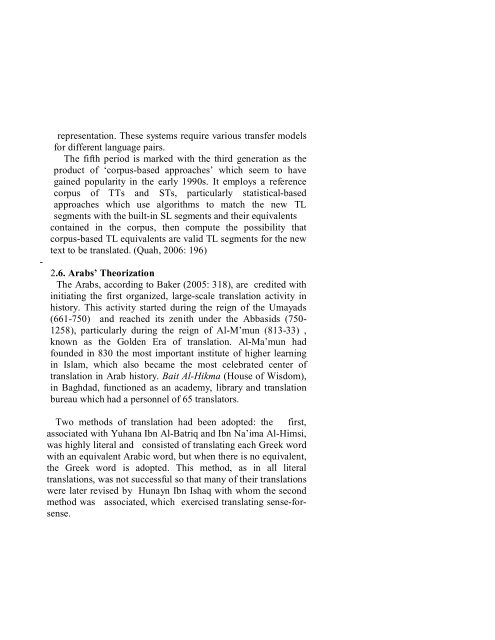424_2061_A.B.
424_2061_A.B.
424_2061_A.B.
- No tags were found...
Create successful ePaper yourself
Turn your PDF publications into a flip-book with our unique Google optimized e-Paper software.
-representation. These systems require various transfer modelsfor different language pairs.The fifth period is marked with the third generation as theproduct of ‘corpus-based approaches’ which seem to havegained popularity in the early 1990s. It employs a referencecorpus of TTs and STs, particularly statistical-basedapproaches which use algorithms to match the new TLsegments with the built-in SL segments and their equivalentscontained in the corpus, then compute the possibility thatcorpus-based TL equivalents are valid TL segments for the newtext to be translated. (Quah, 2006: 196)2.6. Arabs’ TheorizationThe Arabs, according to Baker (2005: 318), are credited withinitiating the first organized, large-scale translation activity inhistory. This activity started during the reign of the Umayads(661-750) and reached its zenith under the Abbasids (750-1258), particularly during the reign of Al-M’mun (813-33) ,known as the Golden Era of translation. Al-Ma’mun hadfounded in 830 the most important institute of higher learningin Islam, which also became the most celebrated center oftranslation in Arab history. Bait Al-Hikma (House of Wisdom),in Baghdad, functioned as an academy, library and translationbureau which had a personnel of 65 translators.Two methods of translation had been adopted: the first,associated with Yuhana Ibn Al-Batriq and Ibn Na’ima Al-Himsi,was highly literal and consisted of translating each Greek wordwith an equivalent Arabic word, but when there is no equivalent,the Greek word is adopted. This method, as in all literaltranslations, was not successful so that many of their translationswere later revised by Hunayn Ibn Ishaq with whom the secondmethod was associated, which exercised translating sense-forsense.27
















